Inferno Park Read online
Page 5
Carter and his dad went to work, wrapping everything in plastic, packing it into green boxes (with the MOOVIN’ ON logo, of course), and finally carting it all out to the box truck, starting with the heaviest furniture. They moved like clockwork, speaking little, communicating with a language of nods and gestures developed during their years working together at the Eight-Track.
His once-boisterous dad had grown quiet and withdrawn over the years. The disaster at Starland had cast a deep shadow over the whole town, and his dad was no exception—around that time, he’d stopped having his friends over to play loud music in the garage, and started looking somber most of the time. Carter hadn’t immediately grasped that the death of the amusement park was also the death of the Eight-Track and the rest of the town, but he supposed his dad had understood that right away.
The Eight-Track’s business had rapidly fallen off until it fell into bankruptcy. The family moved from a small but cheerful house with old hardwood floors into an even smaller apartment in a cheap complex called Sand Dollar Park. Carter’s mom drank more and more, spent nights away from home, and eventually stopped coming back. She’d moved away to Tampa two years earlier with some younger guy she’d met at a bar, and details were sketchy after that.
Carter enjoyed his summers working with his dad, because he understood his dad could lose himself in work, putting the disappointments and troubles out of mind for a while, accidentally becoming like his old self for an occasional minute or two. In good moods, he blasted his old classic rock CDs over the truck’s speakers, like he’d done in the long-lost days of the Eight-Track.
Carter kept busy—wrap, box, pad, repeat. Heavy items in small boxes, light items in large boxes. Seal each with packing tape and write KITCHEN or MASTER BEDROOM or DINING ROOM on two sides with black marker. Repeat. Pay attention and do a lot of nodding whenever the customer spoke. Never take off the stupid cow hat.
He was rolling a hand truck stacked with green boxes backwards down the front steps when he first noticed her. She snapped pictures—with an actual camera, not a phone—of a big white Colonial-style house down the street, set back in the shade of giant, sprawling old trees. It was one of the houses marked FORECLOSURE.
She had dark hair and dressed with a professional look, black pants and a crisp white buttoned shirt, which made him think she was older than him. By the time Carter returned inside and emerged again with the next load of boxes, she was walking closer, snapping pictures of houses along the way. She only seemed interested in those that were for sale.
He happened to take a little extra time unloading that particular stack of boxes, curious to see what the girl was doing. He watched her draw close and realized she was his own age, but he didn’t recognize her.
It was probably the new girl who’d moved into the old Woodman house. He wasn’t sure he was in the mood to meet her, or that he wanted to do it while sweating his face off under his stupid green cow hat, but she kept walking closer while he rolled the empty hand truck back down the ramp.
“Do you mind?” she asked, raising her camera.
“What are you taking pictures of? Houses for sale?”
“The implosion of Western capitalism.” She stepped onto the driveway and snapped a picture of Carter as he wheeled the hand truck—extra slowly—back to the front steps.
“Where did I fit into that implosion?” he asked.
“You’re part of the dissolving process of this neighborhood. Where did everybody go?”
“Away.”
“Why?” she asked.
“Probably that thing you already said. The decline of Western civilization.” Carter hoisted the hand truck up the steps. He definitely didn’t feel like explaining why the town was dying out.
“The old amusement park by the beach. That’s where all those people died, isn’t it? I remember it. I remember the devil’s face all over the news when it happened,” she said.
“That’s the place.”
“The devil’s still there. You can see him over the fence.”
“Yep. Satan watches over us all. I have to go get more boxes,” Carter said.
“Can I take pictures of you rolling them out?”
“You really don’t have anything better to do?”
“I’m making a photo essay about this neighborhood,” she said. “I’m moving in while everyone else is moving out. I want pictures of the old amusement park, too, all of that decay and desolation stuff.”
“Sounds fun,” Carter said. He did not want to talk about it at all, especially not after visiting the park’s front gate earlier in the day.
He brought out another stack of boxes, and the girl clicked several pictures of him towing it down the stairs and unloading it onto the truck.
“How old are you?” she asked.
“Seventeen,” he said.
“I’m sixteen. You know, I thought you were older at first. I guess it’s the uniform.”
“It’s a very professional uniform,” he said. “You’ll notice the cartoon cows on the coveralls and the hat.”
“I like the cows. Are you going to be in school next week?”
“Where else would I be?”
“Just asking. I read the drop-out rate was super-high here.”
“More room for the rest of us,” he said. “I’m not dropping out. I don’t want to be moving people’s furniture when I’m forty.”
At that moment, he happened to see his dad wheeling his own stack of boxes across the front porch. His dad stopped for a moment and looked at him. He’d clearly been close enough to hear what Carter had said, and Carter suddenly felt awful.
His dad didn’t say anything as he lugged his hand truck down the front stairs and up the retractable ramp into the truck. When he’d unloaded his boxes, he looked from Carter to the girl, who was now only a few feet from the back of the truck.
“Hurry up. Long day ahead,” his dad finally said before returning inside.
“I better go,” Carter told her.
“It was nice meeting you.” The girl turned to walk back down the driveway.
“Did we meet? I’m Carter Roanoke.”
“Like the vanishing colony?” she asked.
“I’m not related to them.”
“I don’t think anybody is. I’m Victoria. See you at school.”
He watched for an extra second as she walked away. She seemed nice, but he wasn’t looking to expand his social world, now that he’d gone to all the trouble of shrinking it down to nothing. The world of his school was one of late-night parties and heavy drinking, but Carter was focused on the future.
* * *
Carter’s dad was quiet for a long time as they drove the fully loaded truck west toward Fort Walton. He didn’t even notice when the classic rock station on the radio slowly crumbled into static.
“I don’t want you doing this when you’re forty, either,” his dad finally said.
“I know.”
“You’ve got the right plans. You’re doing the right things. Just keep up your grades and we’ll find the money somehow.”
“Thanks.” Carter doubted his dad would come up with college money, but there were scholarships, plus the exciting world of student loans and lifelong debt.
They drove down the coastal highway, the dark ocean slowly rolling in on their left side, toward the houses of the daring souls who’d built their homes on the water’s edge.
Chapter Three
“This is a bad idea,” Kevin puffed, struggling to pedal his bike fast enough to keep up with Reeves, who sailed ahead on his skateboard, right down the yellow center lines of Beachview Drive. It was one in the morning, but still a risky move to skate down the middle of the road. Beachview was dark at night, with no sound but the slow crashing of the ocean beyond the abandoned motels. Thirteen-year-old Kevin was just barely old enough to remember when this part of the road brimmed with crowds and colored lights, when it had been called the “Starwalk.”
Reeves, skating up ahead, was
Kevin’s next-door neighbor, fifteen years old but also going into eighth grade, having been held back two years earlier. Reeves, with his ever-present red do-rag and cocky smile, was much cooler than Kevin by anyone’s standards, and claimed to have already done it with a couple of girls from school. Even Kevin’s mom seemed to like Reeves better—she was always screaming at Kevin, but dropped everything to make Reeves a sandwich with a side of Doritos whenever he came over.
Years ago, Reeves had given Kevin the name “Beefball,” since Kevin was less than five feet high and more than two hundred pounds. Now all the kids at school called him that. Reeves only hung out with Kevin when no other kids were around, like tonight, when he had come knocking on Kevin’s window a few minutes past midnight.
“What’s going on?” Kevin had whispered after opening his window. He’d been glad to see Reeves, since he didn’t have any other friends, but scared Reeves would get them into some kind of trouble. He’d been right.
“Let’s go to the park,” Reeves had said through the screen, not bothering to whisper. Why should he? Kevin’s mom would probably just make him a sandwich.
“Anderson Park?” Kevin thought he’d meant the small public park in town, with worn-out playground equipment and a tennis court nobody used. Maybe the cool high school kids, the ones Reeves hung out with after school, were having an illegal late-night party there, he thought. Maybe Reeves was bringing him along.
“No, Beefball. The real park.” Reeves had given him a sharp grin, fully aware this idea would scare the hell out of Kevin. A hooting owl could scare the hell out of Kevin.
“You mean Starland?” Kevin whispered. “Come on, it’s too spooky. I don’t want to.”
“What are you, six years old?”
“I was the first time I went there,” Kevin said. “My mom’s boyfriend bought me a thing of cotton candy and gave me ten bucks to go do whatever I wanted for as long as I wanted.” That particular boyfriend had been Todd, who’d turned out to be a real class-A douche-clown, like all Mom’s boyfriends eventually did.
Reeves snickered. “Come out and plop your fat ass on your bike.”
Kevin had tiptoed his way out the front door of the trailer.
“Hurry!” Reeves shouted, already waiting down at the bottom of the stairs.
“Quiet! My mom!” Kevin whispered as he pulled the front door closed.
“Don’t be such a pussywillow,” Reeves said.
“Do we have to go there tonight?” Kevin asked. “We could just go to Anderson Park.”
“Are you scared?”
“No...”
“Little Beefball is scared of the ghosts.” Reeves made exaggerated pout with his lower lip.
“People say it’s really haunted.”
“That’s because they know you’re stupid enough to believe them,” Reeves said. “Follow me. I know the best way.”
Kevin had gotten his bike and followed, reluctantly.
The ride over was scary, the streets dark and lit mostly by moonlight. Kevin’s heart had been thumping as he thought of all the dead kids, the ones people said were still buried there. He knew it wouldn’t be the happy place he remembered from childhood—he knew it would be like an overgrown jungle in there, probably with lots of actual snakes and spiders, and if they didn’t watch out, they could fall into the big hole and land in quicksand with a bunch of dead kids.
Terrified as he was, Kevin hadn’t bothered to ask why Reeves wanted to go. Reeves had been talking about it for days, and Kevin had restless dreams about it for weeks before that. Sometimes in his dreams he saw it as a ruin haunted by the unhappy dead.
In other dreams, the park looked as it had when he was a kid, and he’d taken the dollars from his mom’s boyfriend and gone right to the big food stand shaped like an ice cream cone and ordered the very largest thing they had, a hot fudge and butterscotch sundae served over deep-fried bananas. And he’d eaten and eaten. Later, he’d realized he was too short for most of the rides and had no money left for games, and he ended up hiding behind the Funtime Firehouse, alone and crying to himself until the park’s security clowns found him and reunited him with his mom, who had only gotten pissed at him for ruining her date.
In the best of the dreams, all the games and food were free, and he was allowed on every ride and he loved them all. Those dreams made him want to go back to the amusement park, even if it was scary. He wanted to see it for himself again. He wanted to stand in Space City and see all the high space rides he could have ridden.
So when he rounded the last curve and saw the enormous face of the devil leering over the vine-shrouded fence, the whites of its eyes reflecting the moonlight, Kevin felt an exciting mix of fear and hope.
“Woo-hoo!” Reeves shouted ahead, raising his arms at the devil while he angled his skateboard at the cracked, weedy concrete sprawl of the Starland parking lot. “Hail Satan!”
“Hail Satan!” Kevin tried to shout as he pedaled along behind him, trying to be cool in solidarity with Reeves, but he was short of breath and could barely pant out the words. He’d worn his red Seminoles jersey, wishing he could be like Kevin and go shirtless without everybody seeing how flabby and gross he was. He looked at Kevin’s tanned back muscles with envy.
They stopped at the front gate, Kevin grateful for a chance to gasp for breath.
“Place is so creepy,” Reeves mumbled, kicking aside a bouquet of flowers and a small blue wrapped gift somebody had left.
“People treat it like a shrine,” Kevin said.
“What the fuck is a shrine?” Reeves approached the front gates, sealed with chains and padlocks.
“A place where Catholics and other religions go to pray,” Kevin told him.
“Yeah, blah blah, who cares about prayers?” Reeves shook the gates. “Let us in, you old devil!”
“Sh, don’t make him mad.”
“‘Don’t make him mad,’” Reeves repeated, but in the slow, dragged-out voice of a very stupid person. “Jesus Christ, it’s just a face on a roller coaster, Kevin.”
“I know.” Kevin shivered, his fear taking over his excitement. “Guess the gate’s all locked, though. We better go.”
“Of course it’s locked. Did you expect it to be open, Beefball? Did you expect some guy to sell us a ticket up front? Did you think we were gonna ride the fucking roller coaster?” Reeves took a pack of Basic cigarettes and lit one with a match. He coughed heavily, snorting it out his nostrils, but Kevin still thought he looked pretty cool. “Want a smoke, Beefball?”
“Yeah.”
“Too bad. When you learn to inhale and not waste it, maybe.” Reeves tucked the cigarettes back into his shorts pocket.
“I know how to inhale!”
“The only thing you know how to inhale is cake and pizza.” Reeves glanced down at the little blue present he’d kicked aside, and then a weird grin crossed his face and he picked it up. “What do you think’s in here? Could there be money?”
“Probably just more stuffed animals and crap,” Kevin said.
“Let’s find out.” Reeves tugged at the white satin bow on top of the gift box.
“We shouldn’t do that.” Kevin felt horrified at the idea.
“Why not?”
“It’s just...they left that for the dead kids. It’s not nice.” Kevin couldn’t even put into words how wrong it felt, like a kind of sacrilege.
“Well, if we don’t like it, we can take it inside and give it to the dead kids ourselves.” Reeves tossed the blue present to Kevin, who fumbled but finally managed to catch it.
Kevin studied the little box. The wrapping paper felt expensive, like thick silk, and with white satin ribbons tied in a bow on top. Somebody had spent a lot of money just on the wrapping paper—this wasn’t the cheap Wal-Mart crap with the cartoon reindeer that always tore into pieces around the corners of the box when Kevin tried to wrap his mom’s Christmas present.
Somebody had put a lot of thought and money into this small blue gift box and left i
t here like an offering on an altar. The idea of opening it scared him much more than the idea of sneaking into the old amusement park.
“If there’s money, we can split it. I promise,” Reeves said. “Go ahead. Rip that thing open.”
Kevin stared at Reeves. I’ll do anything you want, he thought. Just treat me like we’re friends when we’re at school. Don’t ignore me or pick on me in front of everybody.
“I want to go to one of those high school parties you talk about,” Kevin said. “Where they let you in because you’re fifteen. Where everybody gets drunk and girls sometimes take their tops off.”
“Whatever.” Reeves laughed. “Open the box, Beefball.”
Kevin wriggled the bow off the present and shoved the length of white satin into his pocket to get it out of the way. Then he slipped a finger underneath one tightly folded corner of the soft blue paper and ripped it open.
Inside was a small velvety black box.
“Holy crap,” Reeves said. “Maybe it’s jewelry. We could sell that for money.”
Kevin felt a glint of hope. While it felt wrong to steal from the dead kids, he could definitely use a few extra bucks.
He opened the box.
Inside was an oval picture frame, showing a mom, a dad, a girl, and a beagle sitting on a couch, none of them looking particularly happy. Along with it, a note:
DEAR LAURI. WE STILL LOVE YOU AND THINK ABOUT YOU EVERY DAY. LOVE, MOM, DAD, SIS, and YAPPY.
“Aw, it’s just garbage.” Reeves grabbed the box from Kevin’s hand and flung it out into the parking lot. It hit about ten yards away, the picture frame skipping like a stone across the weedy pavement, the note fluttering out of sight in the endless soft breeze from the ocean.
Kevin gaped after the scattered gift, shocked that Reeves had tossed it aside so thoughtlessly.
“You said we’d give it to the dead kids if we didn’t want it,” Kevin said. “We should have brought it in for the dead kids, Reeves!”
“Kevin.” Reeves clapped him on the shoulder and gave him a stern look. “You know how I’m always telling you not to act like a fat weirdo fruitcake, or else everyone will know you’re a fat weirdo fruitcake? That is a perfect example of what I’m talking about. Seriously? The dead kids? Come on, let’s find a way inside.” Reeves took a small flashlight from his belt.

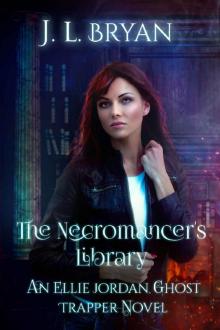 Ghost Trapper 12 The Necromancer's Library
Ghost Trapper 12 The Necromancer's Library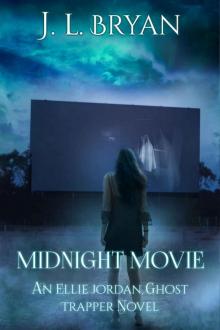 Ghost Trapper 14 Midnight Movie
Ghost Trapper 14 Midnight Movie_preview.jpg) Fairy Metal Thunder (Songs of Magic, Book 1)
Fairy Metal Thunder (Songs of Magic, Book 1)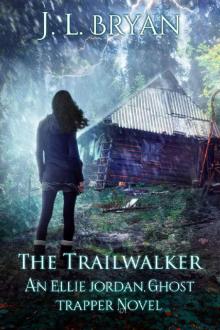 Ghost Trapper 13 The Trailwalker
Ghost Trapper 13 The Trailwalker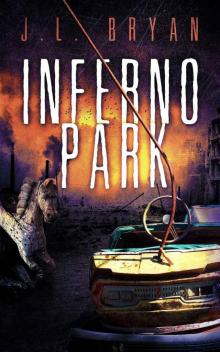 Inferno Park
Inferno Park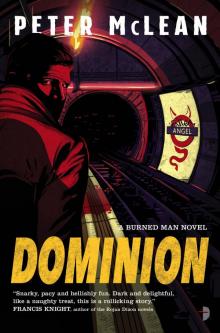 Dominion
Dominion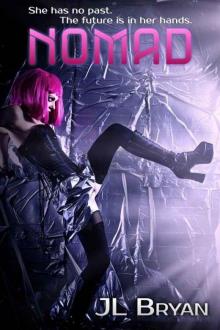 Nomad
Nomad The Tower (Ellie Jordan, Ghost Trapper Book 9)
The Tower (Ellie Jordan, Ghost Trapper Book 9) Jenny Pox (The Paranormals, Book 1)
Jenny Pox (The Paranormals, Book 1) Tommy Nightmare (Jenny Pox #2)
Tommy Nightmare (Jenny Pox #2)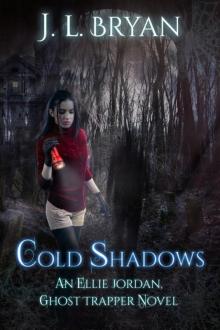 Cold Shadows (Ellie Jordan, Ghost Trapper Book 2)
Cold Shadows (Ellie Jordan, Ghost Trapper Book 2) Alexander Death (The Paranormals, Book 3)
Alexander Death (The Paranormals, Book 3)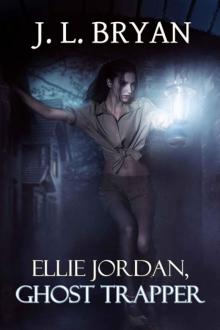 Ellie Jordan, Ghost Trapper
Ellie Jordan, Ghost Trapper Lullaby (Ellie Jordan, Ghost Trapper Book 7)
Lullaby (Ellie Jordan, Ghost Trapper Book 7) EJ06 - Maze of Souls
EJ06 - Maze of Souls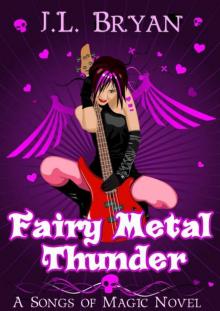 Fairy Metal Thunder (Songs of Magic, #1)
Fairy Metal Thunder (Songs of Magic, #1)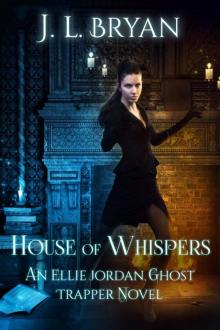 House of Whispers (Ellie Jordan, Ghost Trapper Book 5)
House of Whispers (Ellie Jordan, Ghost Trapper Book 5) Terminal (Ellie Jordan, Ghost Trapper Book 4)
Terminal (Ellie Jordan, Ghost Trapper Book 4) Jenny Pox
Jenny Pox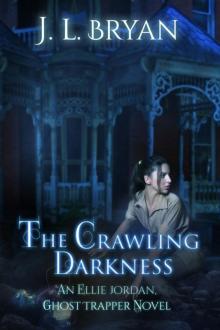 The Crawling Darkness (Ellie Jordan, Ghost Trapper Book 3)
The Crawling Darkness (Ellie Jordan, Ghost Trapper Book 3)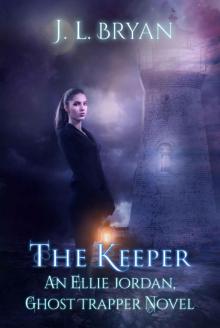 The Keeper (Ellie Jordan, Ghost Trapper Book 8)
The Keeper (Ellie Jordan, Ghost Trapper Book 8)